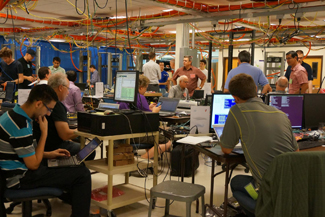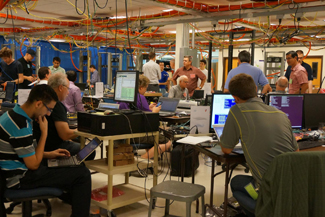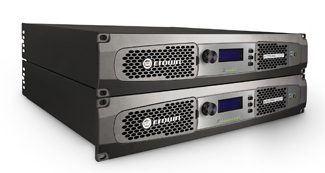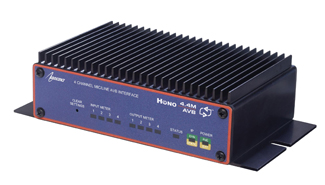The Drill Down: AVnu Certification, Does It Really Matter?

A daily selection of features, industry news, and analysis for AV/IT professionals. Sign up below.
You are now subscribed
Your newsletter sign-up was successful
Networked digital media is the tech trend du jour, but interoperability is the missing puzzle piece when interconnecting systems comprised of equipment from several manufacturers—or even from the same manufacturer. It provides a common language or framework of basic commands and operations that are understood by all devices, and this commonality is what allows even complex systems to be set up and configured with ease. No matter the application or industry, devices have to interoperate in an open way with many other devices, vendors, and manufacturers. That is why standards matter.

University of New Hampshire Interoperability Lab Plugfest
- “Certification of any standards-based technology is important for three reasons. First, it ensures that what is being produced adheres to the standards the certification is built on. Second, it ensures that equipment will work together. And third, certification means multiple vendors are in the market, which positively impacts the price to the end user,” says Gary Stuebing, AVnu Alliance President.
AVB/TSN (Audio Video Bridging/Time Sensitive Networking) is an open standard allowing any vendor to support it, but an open standard alone doesn’t guarantee interoperability. Independent certification is key to ensuring interoperability between devices and a no-compromise AV network that is easier and less expensive to implement.
"Independent third-party verification brings AV to the next level of technology. Often times we find that we're discovering whether our devices and control systems talk to each other through trial and error,” says Josh Srago, manager of audio visual engineering, ICS. “The manufacturers certainly put in some due diligence to provide as many resources as possible for integrators, but it's time consuming and costly for them to test each and every operation or combination thereof. With independent third party verification and testing, we have an outside body that has no stake in the fight for profit, but exists solely to ensure that the products will all live up to the standards set forth and achieve the interoperable status."
AVnu Certification is the first and only open, third party, independent compliance and interoperability certification for media networking in the AV industry. Through this third party testing, AVnu Certification guarantees that all certified products conform to the IEEE open standards for low-latency, time-synchronized, and deterministic delivery of data, and can operate with other manufacturers’ certified products in a mixed ecosystem.

AVnu-certified HARMAN Crown DCi
“The affirmation behind any technology standard lies in the success of its certification program. AVnu Alliance and its member companies have shown a clear commitment to AVB/TSN as the technology that will bring a better future for the Pro A/V market. The Alliance has developed a robust set of conformance tests that ensure each device implements the required standards consistently in order to achieve product certification,” says Joe Leong, Compliance and Interoperability Chairman for AVnu Alliance.
A daily selection of features, industry news, and analysis for tech managers. Sign up below.
AVnu Certification also gives manufacturers a competitive advantage. Certified products build consumer confidence and eliminate guess work for specifiers. If you see the AVnu certified logo on two devices, you know they’ve been tested and proven to work together. This means that manufacturers can help integrators and designers save time choosing the proper devices as well as configuring and managing those devices on the network.
“Extreme Networks chose to pursue AVnu certification for our switching technology as it simplifies the design, deployment, and delivery of audio/video and precise, time sensitive network applications. It removes the complexity of managing and optimizing the network, simplifying system design, costs and maintenance, all while improving performance and reliability of high definition audio and video,” said Todd Acree, Director of Product Management at Extreme Networks, AVnu Alliance member with four AVnu-certified switch families. “Customers see value in purchasing AVnu-certified switching technology because they want to future-proof their infrastructure with multi-purpose technology support. As such, we often find customers including AVnu certification as a requirement in RFPs. Having gone through the certification process, we are able to respond affirmatively to those requirements and set ourselves apart from our competitors.”
AVnu Certification: How does it work?
Pre-Certification Plug Fests
AVnu Alliance members benefit from participating in pre-certification member-only plug fests that offer a unique hands-on opportunity for engineers to test connectivity and interoperability. Plugfests are useful for cross-pollinating best practices between developers from different companies and bootstrapping test plans when common implementation mistakes are seen. Plugfests can also help members spot product issues early on in the process, analyze device behavior and make changes to improve interoperability before entering certification testing.
In-House Test Tools
AVnu Alliance members can replicate a full testing bed with the testing suite from (University of New Hampshire Interoperability Lab) UNH-IOL to test products in-house before submitting for certification. The custom software test tools give members the opportunity to perform conformance and interoperability tests in-house to be better prepared for certification testing. A majority of certification tests can be done in-house with many being automated to return a pass/fail result. Network captures and logs of these tests are also available for further analysis to verify automation and device behavior. For more information: https://www.iol.unh.edu/services/testing/tools/avnu/
The Testing Process
AVnu Alliance chose to do more than simply connect products together and check that they can connect and stream. Instead, they developed a robust set of conformance tests that ensure devices implement the standards consistently. The Alliance defined a procedure that may then be used to certify products to the base IEEE standards.
Before certification can be achieved, AVnu Alliance defines the market specific requirements and develops the conformance and interoperability test plans as well as the testing procedures. The test house produces detailed reports and data that is fed back to the manufacturers to help address any issues they may have. Once deficiencies have been satisfactorily resolved and the product has passed the testing procedures, the test report and certification application can be submitted to AVnu Alliance for formal approval and permission to use the AVnu-certified logo.

The AVnu-certified AudioScience Hono AVB Mini
"We believe it is essential to build products on technology that is future-proofed, allowing consultants and specifiers to trust that it will stay relevant, be easy to implement and ultimately work with other AVnu-certified devices,” said John McMahon, Vice President of Solutions and Strategy for Meyer Sound. “Our customers require the audio in our products to be rock solid with multiple types of devices, even when future devices are added to an existing network. The AVnu Certification process forced us to exercise many edge use cases of the CAL Loud Speaker and fix any potential issue that may have affected customers.Plugfests were helpful during development to ensure we got some early design implementation wins but they never exercise the fundamentals of the architecture to the extent that certification tests do.The AVnu Certification tests allowed our team to ultimately build a better loud speaker that is more robust and fully interoperable for any installation. We are proud to call CAL the first AVnu-certified loudspeaker.”
Acree agreed adding, “The robust AVnu Certification process allowed us to validate interoperability which insures reliability and performance in heterogeneous environments that exist today and in the future.”
“We are currently pursuing AVnu Certification for our Tesira product line because we want to ensure that our customers have the best possible experience when building networked solutions with our products. We believe third-party interoperability certification will drive industry momentum for AVB/TSN as an enduring, ubiquitous networking standard that our customers can easily use and IT departments will embrace,” said Graeme Harrison, VP of Marketing, Biamp Systems.
AVnu Certification means that end users have more choice with best-of-breed products from different manufacturers without worrying if the selected products will work together or not. Interoperability ultimately accelerates a broader ecosystem of devices, which is the long-term advantage of AVnu’s certification program.
VIDEO
MORE INFO
The staff of AV Technology serves the community of decision-makers comprising AV/IT technology managers and directors, instructional technologists, and anyone making or influencing AV/IT technology decisions within their respective facilities and institutions.
